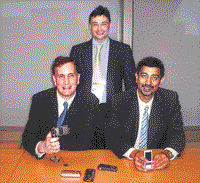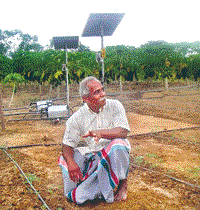|
Microsoft unlocking Sri Lanka’s unlimited potential By Robert Ingall When it comes to trying to release the unlimited potential of a nation where there is a vast divide between those that have and those that do not, there are a number of avenues you can go down. The thing is to find the right street where the architecture of the plan matches the potential of that unlimited talent. One way to do this is the introduction of information technology (IT) to those that have not, but in a way that makes them feel comfortable. So welcome to Microsoft’s Unlimited Potential, where the idea is community learning.
Last week Akhtar A. Badshah, Senior Director, Global Community Affairs, Microsoft, was in town to see how the company’s plan was working here, where he visited a Community Technology and Learning Centre (CTLC), or “Telly Centre”, in Ratnapura. The centre was built with one of its partners, Sarvodaya, an NGO whose “networking grassroots” initiative for rural IT penetration matched that of Microsoft, Mr. Badshah said. Unlimited Potential is a global initiative to promote digital inclusion and increased access to technology skills training in underserved communities. But as Mr. Badshah said: “Microsoft is just the provider of software and cash. We look for organisations in each particular country to take the initiative.” For Sri Lanka one of those partners is Sarvodaya while another is InfoShare, an NGO that focuses on information and communication technology (ICT) for development. Trained as an architect, Mr. Badshah sees his move into his present line of work as natural progression and not “cold turkey”. As an architect he got involved with community development work, where he was also interested in social and economic factors that his work brought him in contact with. And when information technology came onto the scene, Mr. Badshah wanted to get involved to help those at the lower levels of society. As for Microsoft’s long-term plans for Unlimited Potential; the goal is to broaden digital inclusion to bring the benefits of technology and technology skills to a quarter of a billion people by 2010. Presently the company is working in 198 countries, helping out in over 600 projects, reaching 15 million underserved people through existing organisations already on the ground. As for looking for partners, three things are looked for; first, how well established it is, not necessarily in years but in acceptance within the community; second, the scale of work they can implement; and third, their networking ability, such as how many partners they work with. Mr. Badshah said: “It’s all about relationship building. There isn’t any landscaping, we just find the right people. It also helps if we have a Country Manager who is enthusiastic.” When dealing with money, Mr. Badshah said, “Transparency is very important. That’s why we carefully look at who we work with. These organisations have to have a good track record. In the past we have asked for money back from some NGOs. You also have to understand that the bigger NGOs tend to be very accountable as they produce yearly financial records. They have board directors who demand accountability audits.” “Anyway, I prefer to call it monetary evaluating rather then auditing,” he added. Mr. Badshah said as for working out costs, they are worked out hand-in-hand with the particular partners on particular projects, adding that people are sent in to ensure that these projects are going in the right direction. “With Sarvodaya, we are working with a trusted company, helping them with their projects,” he said, where one of the end results is another CTLC in Vavuriya, built to benefit 300 villages and hamlets, via ICT activities at a cost of Rs 20.6 million. With InfoShare, Rs 16.5 million has been disbursed to fund basic technology and job training. With such NGOs, Mr. Badshah insisted that all his company did was to come up with the needed financing and software. He admitted that not all of the projects work. “But that’s OK as things are learned for the next time.” “Scale though is important, where programmes are refined to fit the needs of those working at ground level. We want them to take the initiative; make the decisions,” the former architect said. For problems that might arise from the programme getting too big, Mr. Badshah was not concerned, but he did admit there would be a time when there were enough NGOs on board. “Then we’ll let the organisations we’re working with scale-up. Microsoft won’t, but it will still invest money in worthwhile projects,” he said. He continued by saying that there were shifts taking place in villages that can access ICT centres; where people are getting connected, especially the young; where what was needed next was for a huge improvements in the infrastructure, in general, to move the country forward. For improving quality of life, Mr. Badshah said it was the value-added services that the technology brings, such as designing garment patterns on the PC, as well as being able to sell finished articles over the Internet. He firmly believed that when done properly the living standards in those villages will rise. Asked about resistance from villages though initially
incomprehensibility, he said there had been stories of “brainwashing”
being a big worry, but once the projects were up and running, most
village heads soon saw the potential to improve the village. “But
there have been times when it just hasn’t worked.” And for Mr. Badshah, how does he feel after just over two years in the job, “I’m very satisfied with the work we’ve done and are doing. But the one thing I am really proud of is the scale: the number of projects we have got going to improve the life of under-served communities.” For a company that has over the years had a lot of negative publicity, surely Unlimited Potential will override much of that negativity.
Saliya, new chairman at SLPA Saliya Wickramasuriya, former chairman of the BOI and currently COO of the Reconstruction Development Agency (RADA), was recently appointed the new Chairman of the Sri Lanka Ports Authority (SLPA). Minister of Foreign Affairs, Ports and Aviation Mangala Samaraweera, said at a ceremony following the appointment that a well experienced chairman like Mr. Wickramasuriya was needed for the administration of the SLPA. Mr. Wickramasuriya said he would extend his fullest contribution to carry out the Port’s developmental plans to success, and hoped that all staff members and administration would co-operate with him and extend their fullest support to carry out these tasks. The new SLPA chairman has 20 years of work experience between 1984 to 2004 for Schlumberger Oilfield Services, Inc., the world’s largest Petroleum Services Company, on oil rigs both off shore and land, in oilfields ranging from China to North Sea, and also expertise in Reservoir Evaluation and Management.
RADA’s first Livelihood Development Plan launched Sri Lanka’s Reconstruction and Development Agency (RADA), in collaboration with ILO last week launched the first Divisional Livelihood Development Plan (DLDP) in Habaraduwa in the Galle district. Thirty five more DLDPs are also to be launched in the other affected districts soon to restore livelihoods and expedite development among the Tsunami affected communities, RADA statement said. The plan titled, “Sustainable Livelihood Development for Habaraduwa Division” was presented to the Divisional Secretary of Habaraduwa, Lal Samarasekara at an event on May 11 in which Galle District Secretary Asoka Jayasekara and Saliya Wickremasuriya, Chief Operating Officer of RADA took part. The DLDP, which was finalized after assessing the needs of Tsunami affected villagers of Habaraduwa, is likely to make a significant impact on the long term development of this area once implemented, RADA officials were quoted as saying.
Sri Lanka gets dubious failed state honours International rating agencies have dropped Sri Lanka’s national rating in the past few months as the conflict escalated. The prestigious US Pension Funds has dropped Sri Lanka from the list of investment destinations in 2006. The London War Risk Rating Committee has sounded the warning bells. The latest is Sri Lanka being decorated with a top quartile honour of entering the Failed States Index for the first time. How long more will it be, before the citizens and the business sector awaken? Will there soon be war surcharges imposed on air and sea cargo to and from Sri Lanka? Will the travel advisories soon become more pronounced and brighter red in colour and prestigious travel magazines feature the gruesome state of affairs in Sri Lanka? The happy-go-lucky, mafia type, trigger hungry newly born, empowered and elevated mobs are taking over control of key cities. They are harming the innocent, looting shops, and burning down buildings. Law enforcement arms watch or in some instances are even sowing the seeds of discontent to get the mobs moving in a desired direction and even directly assisting them. The red brigade rhetoric of inflaming the masses are aired over the mass media and talk shops give valuable air time for these goons to place their biased point of view. A young man who loves this nation and recently returned to serve it writes to those who can act and do something about the emerging state of affairs, quoting Edmund Burke, "All that is necessary for the triumph of evil is that good men do nothing" and brings to the notice of his audience the most recent decoration Sri Lanka has been honoured with – A top Billing on the Failed State Index! The second annual Failed States Index has been recently published covering the year 2006. Tens of thousands of articles from global and regional sources have been collected from May to December 2005 and using specialist software, these voluminous documents have been analyzed and contains a review by experts. The failed state index has been compiled with appropriate scores and rankings assigned to each of the 146 nations covered. The previously published 2005 Failed State Index covered 76 countries. The index is compiled based on following 12 assessment indicators
Sri Lanka is in 25th place out of 28 states listed in the “RED” column, having been allotted over 90 marks and is preceded by Pakistan, Afghanistan, Burma, Bangladesh and Nepal in 9th, 10th, 18th, 19th and 20th places. Sri Lanka gains this distinction having been assessed high with marks noted below against each of the above indicators in the order specified above. This gives Sri Lanka 8th place in the Legacy of Vengeance - Seeking Group Grievance, 18th place in the Rise of Factionalized Elites and 19th place in the indicator, Security Apparatus as "State within a State". We can vividly imagine what steps up the ladder Sri Lanka will take in the Failed State Index, if the review period is bench marked between December 2005 and May 2006. Good men please take note before it is too late that this climb may be to a position where in the game of “snakes and ladders”, Sri Lanka gets gobbled up by the snake and falls to the bottom pit in world rankings as a destination for investment, trade and tourism! What consequences this results in terms of long term economic and social prosperity is by no means unknown to the Good Men of Sri Lanka. The publishers of the Index encourage others to utilize the Failed States Index to develop ideas for promoting greater stability worldwide and hopes the Index will spur conversations, encourage debate, and most of all help guide strategies for sustainable security. Are good men of civil society and business going
to do nothing and let the evil triumph or are they going to join
hands with the good men in media, professions, religious groups
and put pressure on the government and the LTTE to place the interests
of the nation and its people and make sure civilian life is unaffected,
and that human and fundamental rights prevail along with law, order,
security and good governance?
Growth, deficiencies and priorities for the government By Sunil Karunanayake Sri Lanka’s economy grew by 6% in 2005 in a year which inflation moderated, current account balance was managed, export and worker remittances grew and a balance of payments (BOP) recorded a surplus. Growth rates are also compiled by other government agencies but the differences between these are not statistically significant. Even without tsunami funding BOP surpluses would have been achieved. Expansion of capacity is essential for higher growth; we need more roads, airports and power plants, but to accelerate growth we must enhance productivity, maintain law and order and achieve peace and stability. Equally important are the structural reforms required to react to changing global conditions, even the developed countries pursue reforms regularly, inefficiencies must be addressed and competition must be encouraged, priority for law and order enforcement and legal and regulatory positions must be strengthened. These were the central points raised by Dr H N Thenuwara, Director of Economic Research of the Central Bank during a recent discussion on the bank’s annual report. Reforms
delayed Central
Bank report Political
decisions Corruption
and productivity It was last month that World Bank President Paul Wolfowitz outlined a comprehensive strategy for tackling corruption, a serious impediment to development and effective governments. During a recent visit to Jakarta the World Bank chief detailed his three-pronged plan on expanding World Bank’s work on governance and anti corruption at the country level in bank projects through partnerships with various stakeholders. Corruption is often the root cause of why governments
don’t work, weakens the systems, distorts the markets resulting
in governments and citizens paying a heavy price in lower incomes,
investment and more volatile economic swings. Role
of the Central Bank
Like having the Internet in your pocket By Vidushi Seneviratne in Hong Kong Imagine – a high quality digital camera, a user-friendly camcorder complete with DVD-like video capture, an integrated digital music player, high speed Internet browsing and much, much more, all in one single device. Too good to be true? With the introduction of the three very latest members in the ‘Nokia N’ series, this unbelievable experience is now a reality. Giving consumers a chance to possess literally every regularly needed technological tool, the Nokia N72, Nokia N73 and Nokia N93 are extremely impressive multimedia computers. Sri Lankans too will soon be able to experience these devices once it’s released in the Asia-Pacific region in June/July.
Launched recently at an event in Cyberport, Hong Kong, media from around the world got a chance to familiarize themselves with the three devices and its features. Modeled on what seemed like a high-tech studio, the event consisted of various stalls featuring exactly how consumers could experience the key features of these multimedia computers. The products were launched simultaneously in Berlin, Germany as well.
Under the tagline “See New, Hear New, Feel New,” numerous areas such as the ability to take high quality digital pictures, edit, print and even upload photos directly to sites and albums, make DVD-like quality movies, watch mobile TV, browse the Internet, listen, store and even “watch what you hear” with visual radio, were creatively illustrated at the event. A sub series of Nokia, the Nokia Nseries is a
range of high performance multimedia computers delivering multimedia
experiences by combining the latest technology, style and ease of
use.
“We conduct continuous consumer research, and it this that helps us produce successful devices. According to such research, a large number of people have told us that they use their mobile phones as their primary camera, as well as their MP3 player and even as their primary means of browsing the Internet. The Nseries gives them all of this, being a multitalented multimedia computer. A pre-requisite for any technological device is of course ease of use, and striking the right balance between including the latest technology, while keeping it user-friendly, is vital. “It’s all about handling this dual challenge successfully. In the Nseries devices, we have created technologically advanced devices, but have kept it user-friendly, as with all other Nokia products,” said Hedman. Also, keeping the ease of use quality compatible to the eco system of multimedia computer is important as well. The facility of being able to plug in the device
easily to other machines and so on should be considered as well.
Embodying all of these qualities, the Nokia N72, Nokia N73 and Nokia
N93 are impressive multimedia computers that would give you a wholistic
experience, in whatever technological aspect you require. Created to easily substitute a range of products that you would normally own, such as digital cameras, camcorders, laptops, radios and MP3 players, these Nseries multimedia computers will be a worthwhile buy for Sri Lankans.
Australian irrigation systems improve life of Lankan farmers A new joint project between Australia’s BP Solar Pty Ltd and the Sri Lankan Ministry of Agriculture Development is bringing an initial 5,000 solar powered drip irrigation systems to farmers throughout the dry zones of Sri Lanka. The Australian government is supporting the project, which is known as the Sustainable Agriculture Water Management Project (SAWMP), through the Export Finance Insurance Corporation (EFIC) and the Australian Trade Commission (Austrade), an embassy statement said. Chamal Rajapaksa, Minister of Agricultural Development, Dr Greg French, Australian High Commissioner, Les Poole, Director, BP Solar Pty Ltd, Ian Gates, Associate Director, EFIC, along government representatives, recently visited a project site in Hambantota district.
“Minister Rajapaksa and the delegation heard
from farmers in Hambantota and other districts that the Australian
technology enabled a significant improvement in their productivity,
net income and overall wellbeing. Yields increased by 2-3 times,
the number of crops increased from 2 to 3 per year, and water use
efficiency increased by 90% compared to conventional petrol engine
pumps with furrow irrigation. Fuel costs were eliminated and maintenance
was easy. In addition, the displacement of fossil fuels through
use of solar energy for irrigation increases safety and helps reduce
greenhouse gas emissions,” the statement said. |
||||||||||||||||||||||||||||||||
Copyright © 2006 Wijeya Newspapers
Ltd. All rights reserved. |



